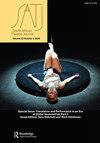The missing language of freedom: code-switching in Yaël Farber’s Mies Julie (2012)
IF 0.2
0 THEATER
引用次数: 0
Abstract
In 2013, Yaël Farber’s adapted August Strindberg’s naturalistic drama Miss Julie into a contemporary play, set in South Africa’s Cape Karoo semi-desert. Farber maintains in her version the various concerns the original play addresses, including class and gender, however by transporting the play to post-Apartheid South Africa, questions pertaining race and identity are reflected upon in a socio-political context. Farber negotiates these issues primarily through the use of language, utilizing code-switching throughout her contemporary parable. Farber uses code-switching as a means to reflect the despair of a nation, the search for a unified identity and the desire for intimacy of the characters. Achille Mbembe argues that South Africa has a crisis in language, however this paper argues that this alleged crisis, the continuous use of multiple languages is precisely the language of post-Apartheid South Africa. A language, which reflects the liminal state of the nation, the cultural variety of the country as well as the continuous search for a unified identity.缺失的自由语言:Yaël Farber的Mies Julie(2012)中的代码转换
2013年,耶尔·法伯(Yaël Farber)将奥古斯特·斯特林伯格(August Strindberg)的自然主义戏剧《朱莉小姐》(Miss Julie)改编成了一部当代戏剧,故事发生在南非的卡鲁角半沙漠。法伯在她的版本中坚持了原剧所涉及的各种问题,包括阶级和性别,然而,通过将该剧转移到后种族隔离的南非,与种族和身份有关的问题在社会政治背景下得到了反映。法伯主要通过语言的使用来解决这些问题,在她的当代寓言中使用了代码转换。法伯使用代码转换作为一种手段来反映一个国家的绝望、对统一身份的追求以及人物对亲密关系的渴望。Achille Mbembe认为南非存在语言危机,但本文认为,这种所谓的危机,多种语言的持续使用正是后种族隔离南非的语言。一种语言,它反映了国家的极限状态、国家的文化多样性以及对统一身份的不断追求。
本文章由计算机程序翻译,如有差异,请以英文原文为准。
求助全文
约1分钟内获得全文
求助全文

 求助内容:
求助内容: 应助结果提醒方式:
应助结果提醒方式:


